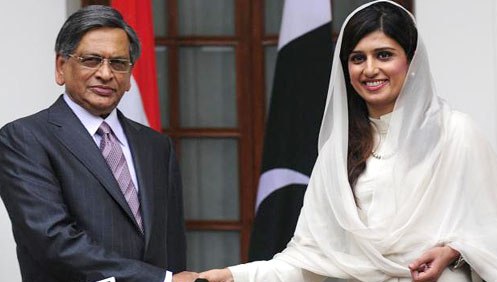
New Delhi, October 28: Personal chemistry helps in diplomacy. Recalling his years as foreign minister, SM Krishna on Saturday said he forged a "good understanding" with his Pakistani and Chinese counterparts, Hina Rabbani Khar and Yang Jiechi respectively, which helped him to improve India's relations with these countries.
"I had a good understanding with Hina Rabbai Khar and Yang Jiechi," Krishna told reporters here to queries whether he forged personal relationships with world leaders and foreign ministers of other countries during his stint as foreign minister.
He also spoke about personal equations with Brazil's Foreign Minister Antonio de Aguiar Patriota and South Africa's Maite Nkoana-Mashabane. Last but not the least, he spoke warmly about US Secretary of State Hillary Clinton with whom he co-chaired three rounds of the India-US strategic dialogue.
When Krishna became the foreign minister in May 2009, India's relations with Pakistan had plummeted to a new low following the 26/11 attacks and the dialogue process with Pakistan was frozen.
A year later, Krishna went to Islamabad with a view to resuming the peace process, but aggressive posturing by the then Pakistani foreign minister Shah Mehmood Qureshi led to the collapse of the talks. Qureshi was replaced. The relations showed signs of improving after Khar became foreign minister in July last year and made her first visit to India.
Although Krishna is more than three decades senior to Khar, Pakistan's youngest foreign minister, the two had a mutual regard and developed a rapport over the next few months, informed sources said. This rapport was reflected in the changed tone and atmospherics in the India-Pakistan relations, leading eventually to the resumption of the dialogue process in February last year.
Recalling his efforts to improve relations with Pakistan, Krishna said: "I made two trips to Islamabad. Pakistan's Foreign Minister Hina Rabbani Khar came to Delhi. That certainly did improve the relationship between the two countries."
Similarly, Krishna managed to forge personal equations with the Chinese foreign minister, who praised Krishna's statesman-like quality when the two met in Beijing in June on the sidelines of the Shanghai Cooperation Organization meet.
In the last three years, India's relations with China came under strain on many issues, including incursions, and issuing of stapled visas to Indian residents of Jammu and Kashmir, but a pragmatic approach by the leadership and foreign office of the two countries ensured that the relations remained on an even keel.
Bilateral trade has exceeded $75 billion, and is likely to reach $100 billion by 2015.
"We have a border dispute with China but that didn't affect the overall relationship," Krishna said a day after he resigned to make way for "younger blood".





Comments
Add new comment